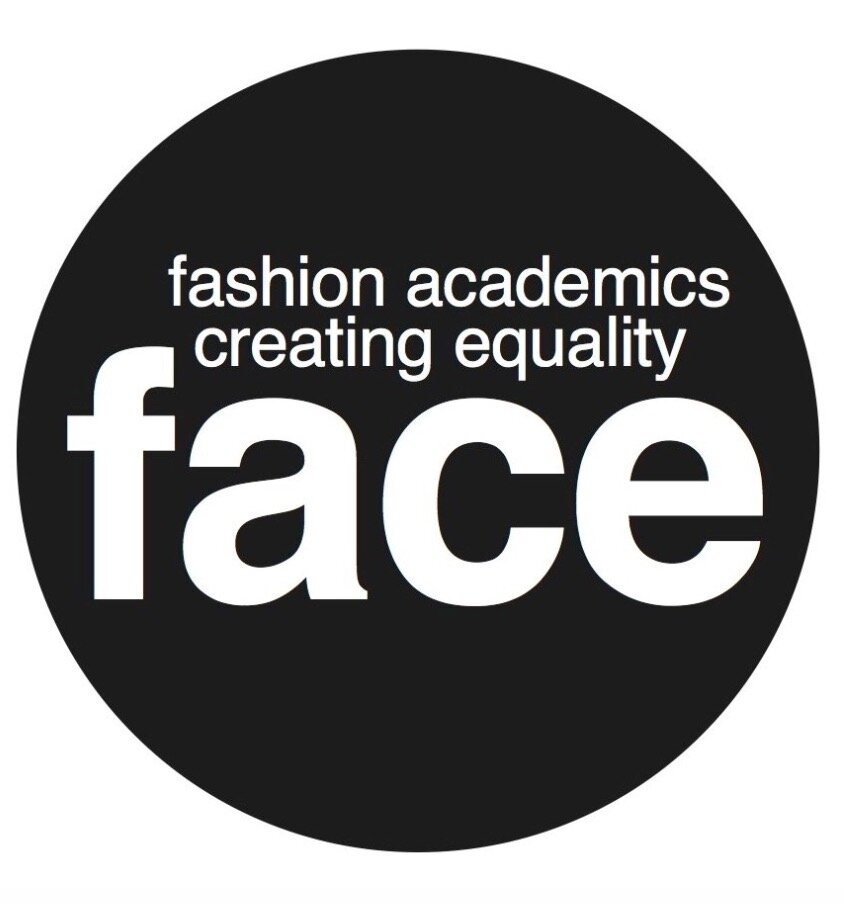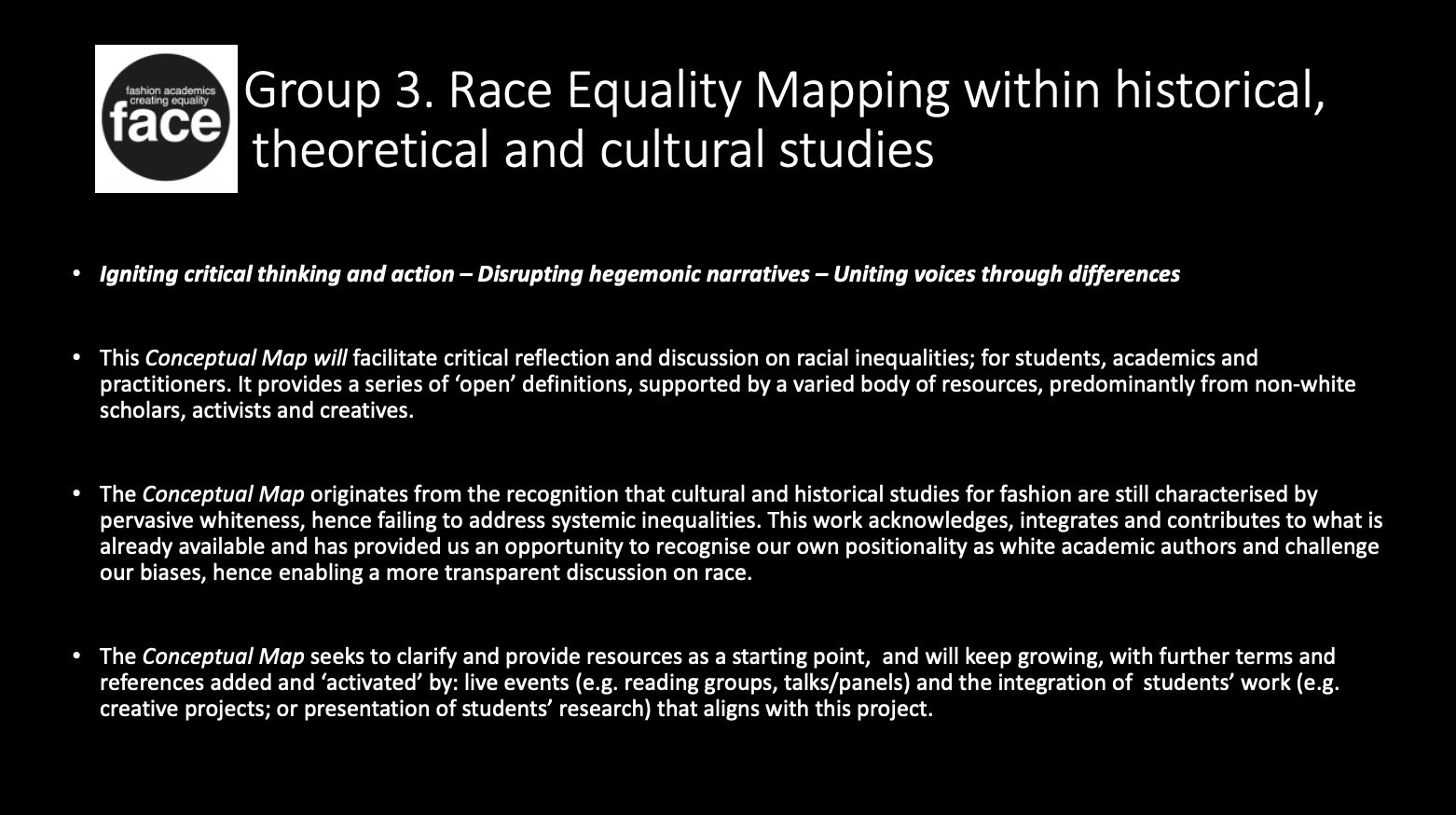FACE Associates Projects
Call to Action for all FACE Members. Please promote the two completed projects BELOW to your institutions. See below for more details
-
Action
We are white anti-racist academics: associate lecturers, heads of school, course leaders and students sharing best practice in pursuit of speedy race equality progress.
All minoritised and non minoritised students: undergrads to post grads welcome
Meet our colleagues on the Associates page.
-
Join and Meetings
We meet fortnightly as both a collective and in individual groups. Augmenting our institutional progress, we research and produce from a ‘cross institutional,’ perspective, pooling resources and knowledge. Meeting dates and associate membership here
Meetings chaired by John Boddy Falmouth University, Caryn Franklin MBE Kingston School of Art. Linda Mackie Winchester School of Art
-
Projects
FACE Summit 2022 - completed
Widening Participation Film - completed
Toolkits - peer to peer mentoring -underway
See below for further information of Toolkits
Toolkit Foreword
Toolkits still undergoing completion
This Toolkit is a result of collaborative work by FACE associates: white academics and students of colour in collaboration with Black and Brown FACE members and mentors. Gathering from approx. 30 institutions nationwide, the authors unite behind the agenda of POSITION POWER PRIVILEGE PURPOSE to counter apathy, stagnation and resistance within individual institutions. Our goal is to progress white colleagues looking for peer assistance and resources from the FACE platform.
Having acknowledged our whiteness, and cultural knowledge deficits we recognise our complicity in maintaining structures and hierarchies. We de-centre previous language and formats as part of this multi-layered learning journey. Expanding horizons and personal growth is essential for academics in all fields and this document invites revision at regular intervals from all users. Let us begin, with immediate and urgent recognition that our students’ are entitled to culturally competent, radically decolonised learning aids NOW. The Assessment Module Toolkit therefore equips the reader with tools and vocabulary for future anti-racist assessment of all students.
Co-chairs John Boddy Falmouth, Linda Mackie Winchester, Caryn Franklin Kingston School of Art
Associate Projects
COMPLETED
FACE Summit 2022
Hosted by Central Saint Martins
This free event was for everyone.
See dedicated page with links to filmed panels and speakers here
The FACE Summit took place on Thursday 13th October 5-8pm (GMT) & Friday 14th October 11.30 am-7pm (GMT) to platform research on identity, power, representation and belonging. This is an intersectional fashion platform led by Black and Brown Academics
The FACE Summit was filmed. A menu of events and links can be found here
Lead Academics: Hywel Davies and Tanveer Ahmed: Events Chair - Central St Martins. Team - Caryn Franklin Kingston School of Art, Mark Hall, University of Derby Brigitte Stockton Buckinghamshire University Joshua Williams Bath Spa Karen Heard-Lauréote Solent University
Whatever it is, the way you tell your story online can make all the difference.
Radical Curriculum Decolonisation Action : 1. Modules
Lead Academic: Dean Liggett, Ulster University. Team - Bernadine Murray University of Chester, Seher Sadiq Northumbria University, Mal Burkinshaw Edinburgh University, John Boddy Falmouth University
*
Radical Curriculum Decolonisation Action : 2. Curriculum Assessment
Lead Academic Deborah Campbell, Winchester School of Art: Team - Linda Mackie Winchester School of Art Prae Chaiphet London College of Fashion, Dr Jessica Holtaway Solent University.
*
Radical Curriculum Decolonisation Action : 3. Historical, theoretical and cultural studies
Collective - Tegan Rush Central Saint Martins, Flavia LoscialpoSolent University., Elaine Igoe Chelsea School of Art, Sabine Lettmann Birmingham City University, Asiya Durrani-McCann Southampton University
COMPLETED
Radical Curriculum Decolonisation Action : 4. Widening Participation
Lead Academic: Joyce Thornton, University of Westminster. Team - Erin Lewis Royal College of Art, Jess Holtaway Southampton Solent, Marc Provins Liverpool John Mores University, Nayaab Mahomed De Montfort University, Donna Bevan Southampton Solent.
Now completed this free film for all institutions features non-white fashion students on a range of fashion course and can be used as part of your outreach to Art and Design education at levels 1,2 and 3 and National Saturday Clubs. This film is made in association with the Westminster film department.
View film: Fashion Needs Colour here and please use it!
Food for thought…
Post grads only signify that white, middle-class people have been funded to look at creativity from a white perspective through the lens of white privilege.
With institutions pleading scarcity of Black and Brown job applicants, our academics of colour know differently, starting with the all-white interview panel when they apply for the job and moving to the obvious race-barriers of qualifications which require income and class privilege to achieve.
Why not FLIP your recruitment wording?
“We are looking for an accomplished educator with experience of global industry narratives and diverse fashion culture. We require applicants to have lived experience of Black fashion and Black culture in addition to standard European contexts and experiences.”
Best Practice: Recruitment
Wondering how your job wording could invite Black and Brown academics into the building? See the following recruitment statement from LJMU mentored by co-founder Andrew Ibi.
“The School of Art and Design is currently under-represented with regards to staff from a Black, Asian, and other Minority Ethnic background and is actively promoting diversity in its workforce. We welcome applications from all eligible applicants. However, we would like to encourage applicants from the Black, Asian, and other Minority Ethnic communities who are currently under-represented within this area of work. Appointment will be based on merit.”
“Employ more Black and Brown People. What’s the issue? All you have do is be explicit.”
Co founder - Andrew Ibi
UAL’s goal of 30% employment of Black and Brown academics by 2025 requires targeted action. Consultations are offered to Black and Brown academics prior to application. See this statement included in all of their job specs.
UAL is committed to addressing the under-representation of staff from Black and Minority Ethnic communities, using our student profile as a reference point. During the Academic Futures recruitment campaign of 2021, we will therefore be offering application consultations to prospective candidates from this under-represented group.
If you identify as a Black or Minority Ethnic candidate and would like to book an application consultation, please fill in this short form Academic Futures Consultation Expression of Interest.
Recruitment discussion with FACE.
Question
“Hi there FACE. At our institute we are thinking of making new appointments at a senior academic level. We want to ensure that any recruitment process engages with all of our colleagues, and this is particularly the case with Black and Brown academics and practitioners.
I note that it is possible to post academic vacancies on the group's website, which is great, but I am keen to know if there are other networks, within the UK or beyond, that we should be participating with.”
Answer
Co-founders have been talking about exact issue, with Abid Qayum Head of Technical Services at the Royal College of Art. We will expand this strand of conversation at FACE Rep meetings.
Recruitment process is KEY and needs focussed development. We are working with Abid to develop knowledge of clearer routes to market and will post these conversations as we go.
So... the short pro-active answer is that while we investigate specific networks for this purpose, FACE can put your info on our website, promote it on our Instagram, prompt our individual members to promote it amongst their communities and be involved in this dialogue. Please give us the details and the link. And then please consider whether your institution would make a donation to FACE in exchange for our resources.
The question you raise, needs much ongoing discussion but here are 3 points from our discussion with Abid, which we hope begin bigger conversations in your institution and amongst your colleagues. Please keep us all in the loop at meetings and by email.”
Where is the acknowledgement by the institution that leaders have understood the value of race and culture narratives?
Language: To consider, and within your power at this stage, is the wording. Where is the specific invite to Black and Brown academics or technicians? Can they know they will be specifically welcomed? Where is the acknowledgement by the institution that leaders have understood the value of race and culture narratives; so vital for the relevance and credibility of their course; and that most importantly this individual will be part of a race-aware environment. (Please read the blog post on white denial to understand the inherent culture most Black and Brown academics experience when white people deny race issues). A clear message of race-aware process, that frames the job specifics is now needed. The wording can no longer be treated as fixed process and leaders must initiate new process immediately.
The recruitment board is nearly always exclusively white
Interview: The recruitment board is nearly always exclusively white. What message does this deliver to the applicant in terms of the community they will experience? What biases do the interview panel bring? And what work have they done to recognise how isolating this experience will be for the applicant? We know the interview prioritises other aspects aside from skills, like who will fit in, who understands the culture of the university. This plays to white-centricity and the culture of white alumni having graduated with higher degrees. Please read the attainment gap post in the blog to question how the conversations be shaped going forward to acknowledge this inequality.
How will this obvious and unspoken white-centric protocol be discussed prior to interview?
Attainment and progression: As Guardian reports show, Black and Brown academics experience considerable suppression of their progress, isolation within the workplace and multiple workplace aggressions as a result of white denial. This is corroborated by FACE member experience over and over again. How will this obvious and unspoken white-centric protocol be discussed prior to interview amongst white teams and in interview to acknowledge the learning being undertaken by said white teams?





